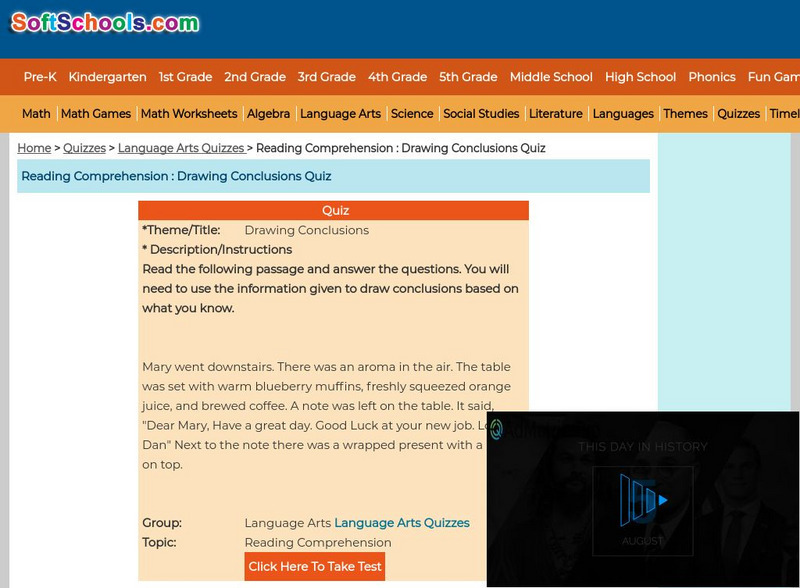Hi, what do you want to do?
Curated OER
Meet the Eastern Flock: Hatch Year 2002
Students read nonfiction books and magazine articles about whooping cranes.
Curated OER
What are the Issues?
Seventh graders complete political analysis activities. In this political analysis lesson, 7th graders discuss party platforms and research party issues for their party's candidate's positions. Students complete an issues organizer and...
Curated OER
Infectious Diseases
Seventh graders create a brochure for a fictional pharmaceutical company.
Curated OER
"My Side of the Mountain"
Students demonstrate comprehension skills be retelling 6-8 significant events. They identify new vocabulary words and determine the meaning by using context clues.
They contribute to group discussion by sharing at least 1 idea/reflection...
Curated OER
East Asia: Current Events
Ninth graders read and evaluate current events of East Asia. They select an article, read and summarize the article and identify the key people, places, dates, and events in the article. As they summarize, they write a personal...
Curated OER
Enrichment Activities - "Mrs. Frisby and the Rats of NIMH"
Fifth graders read the novel "Mrs. Frisby and the Rats of NIMH." They discuss the various characters in the book, and the different types of conflict that take place within the book. They also research owls and rats to make comparisons...
Curated OER
Standard Linear Form
Ninth graders identify and describe the x-intercept as the place where the line crosses the x-axis as it applies to football. They create their own differentiations to reinforce the distinction between the x-intercept and the...
Curated OER
"Julie of the Wolves"
Fifth graders research life in Alaska and compare life there to their lives in this lesson. They read "Julie of the Wolves." They research through the novel and other reference books facts about the Alaskan climate and geography. They...
Curated OER
Take Me to the River
Students learn about a different way of life. In this river and dams lesson, students discuss the Hoover Dam. Students then view pictures of the Hoover Dam, discuss the impact of dams, and compare life before and after...
Curated OER
Say It Like A Character
Students read a story and retell it to the class by role-playing one of the characters. In groups, they use the correct facial expressions along with body language and voice to convince the others in their group that they are actually...
Curated OER
Religious Dissent
Students perform a readers theater about Anne Hutchinson and her religious dissent. In this religious dissent lesson plan, students re-enact her trial through the reader's theater.
Curated OER
PICTURE READING - PARAGRAPH WRITING
Students investigate the elements found in a media image. The image is used to compose a descriptive paragraph. They exchange papers to discuss the writing and make changes using constructive criticism. Students also make connections...
Curated OER
Creating Context: The Printing Press as Impetus
Tenth graders examine the invention of the Gutenberg printing press and its effect on society. In groups, they research how much the press enabled various revolutions around the globe. They also identify the causes and effects of each...
Orange County Department of Education
Integrity and a Boy Called Slow
Fifth graders identify the character trait of integrity in the main character, Slow, in "A Boy Called Slow." They participate in a discussion to determine what steps the main character took to earn his new name. Students write an essay...
Orange County Department of Education
Katie's Trunk
Fifth graders read the story of "Katie's Trunk". They identify the traits of integrity and fairness in the characters John Warren and Katie. Students explore how people can experience the same event but interpret it differently. They...
Curated OER
Rain Forest Birds
Fifth graders look at the levels of the rain forest. In this rain forest lesson, 5th graders choose a rain forest animal and explain which of the four levels of the rain forest they think that animal lives in. They also complete a word...
Curated OER
Exhibiting Your Knowledge
Students are introduced to the various museum functions. In groups, they create a traveling exhibition based on Gutenberg's invention and the first printed book. They share their exhibition with the class and answer any questions presented.
Soft Schools
Soft Schools: Drawing Conclusions
Read a literary text paragraph and then answer questions that require the reader to draw conclusions from the text in this nine-question quiz.
Read Works
Read Works: Fourth Grade: One Lesson Unit: Drawing Conclusions
[Free Registration/Login Required] Students are guided through a lesson to understand the difference between explicit information and conclusions drawn from a text. With free login, users have access to passages used in this lesson.
Texas Education Agency
Texas Gateway: Synthesize Ideas and Details in Several Texts (English I Reading)
In this lesson, you will practice making connections between ideas on the same topic. Some of the ideas will differ from each other, so we will learn how to identify and synthesize important details and draw conclusions. W.9-10.7 Research
Texas Education Agency
Texas Gateway: Understanding and Analysis of Literary Text: Meter and Rhyme
OnTRACK English II Reading, Module 3, Lessons 1-12, and Practice Lessons 1-3. Students understand, make inferences and draw conclusions about the structure and elements of poetry, drama, fiction, and literary non-fiction, and provide...
PBS
Pbs Learning Media: Everglades
In this video segment from WILD TV, a scientist in the Florida Everglades talks about her research on the pig frog. [6:25]
Texas Education Agency
Texas Gateway: Compare/contrast Themes and Genres in Literary Texts
You will learn how to analyze, make inferences, and draw conclusions about theme and genre in different cultural, historical, and contemporary contexts and provide evidence from the text to support your understanding.
Other
Peoples Education: Make Inferences in Science [Pdf]
This online textbook selection focuses on how scientists make inferences from evidence. Students are given a reading passage about underwater exploration and are asked to make inferences based on the text. The passage is followed by...



























